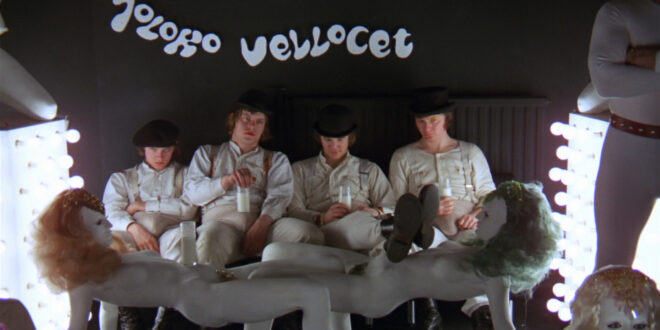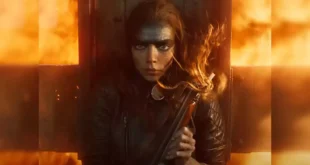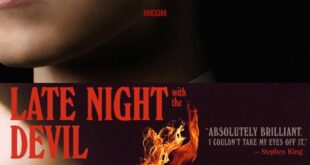I’ve long had a fascination with Stanley Kubrick and his films. He’s one of my all-time favorite filmmakers. On my Mount Rushmore of greatest filmmakers. The thing that grabbed me first when I watched them when I was younger was the uniqueness of Kubrick’s cinematic craft. His distinct imprint is felt everywhere on the screen. A Clockwork Orange came out with Kubrick at the height of his craft and power. Having come off the game-changing 2001: A Space Odyssey in 1968, Kubrick decided to give us a much darker version of the future by adapting Anthony Burgess’s 1962 dystopian novel. He would create his most shocking, controversial work ever.
I have seen A Clockwork Orange many times, but for the first time, I saw it on the big screen a few nights ago, which is always my preferred experience for any film. I saw it with a decent-sized crowd as well. One would hardly call the movie a feel-good cinema experience. Right away, you’re treated with a ghastly home invasion and rape set to Gene Kelly’s Singin’ in the Rain (Kelly would never forgive Kubrick or McDowell); that’s one of the most unsettling sequences ever put on film. Having seen the movie, I knew it was coming, but watching it on the big screen was genuinely disturbing. Almost like when Alex is strapped to a chair and forced to watch horrifying images later in the film. Like a car accident, though, you can’t look away. Alex, through narration, invites the audience to witness his form of entertainment and evil, and we do.
The film is presented in two distinct halves (much like Full Metal Jacket in 1987). The first half is Alex and his gang of droogs romping and terrorizing their way through dystopian England with reckless abandon. Because we see it from the point of view of Alex, who is charismatic and cultured, we almost feel attracted to him. We’re horrified by what he does, but at the same time, he is charming. Especially in the way Alex talks and plays with language. So much so that we don’t seem to get lost through the made-up language, as Alex always gives us an idea of what he’s talking about. Malcolm McDowell’s delivery is perfect. In some perverted way, we’re not much different from Alex. We go to the cinema in part for violence and entertainment. Alex is merely taking you on the ride.
Alex is very much a dictator-like character to his gang, and eventually, his droogs turn on him because they’re tired of his tyrannical ways. He is arrested and taken to prison. It’s here where the second half of the film begins, and we see now that the authorities are no better, if not worse, than Alex. The only difference is the police and government doll out their abuse at a higher status level than Alex. Alex pretends to be interested in reform, but it’s a ruse to get out of prison early. He unwittingly participates in the Ludivico Technique, a new government program designed to “cure crime” through science.
Arguably the film’s most famous scene is when Alex is strapped to a chair with eyes forced open and watching horrific evil acts which eventually condition him to be grotesque by violence or even the slightest confrontation, not to mention they kill his libido as well. This scene is particularly horrifying because Alex is not taught that these acts of violence are wrong. He is being brainwashed to get sick at the thought of them. The ability to choose right from wrong has nothing to do with it. At the very heart of this theme thematically is free will. You can’t be forced. You have to want to do good. You have to want to reform.
Everyone uses Alex for political gain. The conservative government and the liberal dissident writer. After Alex is released from prison, he can no longer defend himself because of his aversion to violence, leading to a tremendous double backing on events earlier in the film. His droog friends are now cops (cops and criminals are indistinguishable), and they leave him for dead, and wouldn’t you know, he ends up back at the house where the rape occurred earlier in the film. The writer (Patrick Magee in one of the film’s more memorable performances) initially wants to help him. Still, after finding out who he is, he immediately sets about torturing and killing him. So much for the writer’s supposed kindness and good intentions, though one might argue Alex deserves it; the film and book are very much about the brutality of violence and torture, no matter who is dishing it out.
From a sheer cinematic perspective, A Clockwork Orange is perfect. Kubrick’s sets are so unique, and the characters dress and act so mannered and specific that there are characters and shots from this film you’ll never forget. Kubrick shot the film on location to avoid building sets, and though this is supposedly a dystopian future, it also feels very of the moment for a science fiction story. Kubrick used handheld cameras to give the audience a more intimate feel. There are times when the film does feel claustrophobic. The scenes of violence range from horrifying to almost cartoony, but they are always very stylized. Much like Alex’s detachment from his victims, there’s virtually a stylized detachment from how the violence is filmed.
2001 and Clockwork are Kubrick’s two significant warnings about relying too much on science and how machines cannot overtake humans and their abilities to make human decisions. Though a strict watch, needless to say, A Clockwork Orange is also highly rewatchable due to the cinematic process of Kubrick as well as the complicated questions it asks. The film is still as powerful and in your face as I’m sure it was when it premiered 50+ years ago. Having seen it in 2023, I can safely say this film is still relevant today, even more so. Its vision of a dystopian future fits in today’s world. The fascinating thing about watching Kubrick films is they never feel stale or tired. Each viewing is like seeing it again for the first time. That’s why I always advocate rewatching Kubrick pictures.
 Movie Finatics The Place for Movie Lovers
Movie Finatics The Place for Movie Lovers




